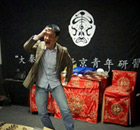-
-
China Daily E-paper
From Overseas Press
Marvelous work in quake relief
(Chinadaily.com.cn)
Updated: 2010-04-19 15:23
 |
Large Medium Small |
In the?past few days, the devastating Yushu earthquake has been headlines of overseas media. The foreign reporters are impressed by Chinese government’s swift and effective help for the earthquake zone, and believe outpouring of support from Han Chinese in the wake of the disaster "will touch Tibetan peoples' hearts."
Wall Street Journal April 18
A flood of tents, blankets and other relief supplies began pouring in for the homeless and hungry survivors, as Chinese President Hu Jintao flew in to tour the region.
China's top leaders have played a prominent role in the government's response to the quake. Premier Wen Jiabao also traveled to quake-hit areas on a tour that was well-publicized in China's state media.
Guoyang Zhaxi, an ethnic Tibetan Jiegu resident and volunteer helping distribute relief goods Sunday, said "people's moods are stabilizing" as supplies flow in and morale has improved after the visits by President Hu and Premier Wen. He said the relief efforts are "a chance for the central government and Communist Party to change relations between themselves and Tibetans."
He said the outpouring of support from Han Chinese in the wake of the disaster "will touch Tibetan peoples' hearts." He said Yushu's location in the center of the country's Tibetan areas gives public attitudes there special influence. "Changing attitudes among people in Yushu will drive an attitude change in all Tibetan areas."
Time April 15
Beijing is throwing the might of the state into an aggressive rescue and rebuilding campaign in Qinghai, sending a huge amount of resources to the remote mountain area.
"The government does a finer job than many when it comes to crises," says Russell Leigh Moses, a Beijing-based political scholar. "The sort of centralizing impulses that have been the hallmark of the current leadership enables them to respond in a large way and quickly. It's very good at confronting a tragedy, and it's adept at cleaning up afterward. And it's also very quick to claim credit."
Newsweek April 15
Online, Han Chinese have responded overwhelmingly and unambiguously. Twitter and bulletin-board systems have been filled with support. "Tonight, we are all from Yushu," tweeted Wu Botao, echoing the call for support during the Sichuan earthquake. One NetEase forum is filled with pictures of mostly Han Chinese holding up handwritten signs showing support for the region. One Netizen tweeted, "Let's pray for the blessings for our compatriots in the Yushu Qinghai disaster zone." Another posted, "Yushu I believe everything will get better." This is sympathy, not schadenfreude.
The response could warm Tibetan feelings toward China. Despite the difficulty of getting supplies into this mountainous and remote area, by all accounts the relief effort so far has been conducted quickly and competently. "It's a pretty impressive response, and one that, for its effectiveness, is bound to be recognized by local communities for what it is," says Ben Hillman, a Tibet expert from the Australian National University's China Institute.









